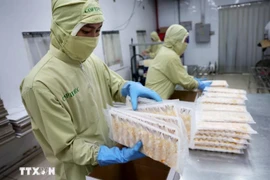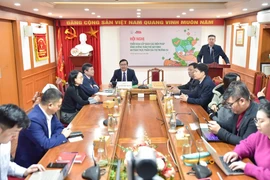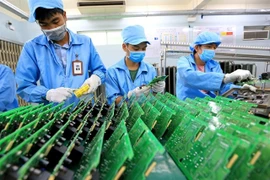Hanoi (VNS/VNA) - Northern Europe is emerging as one of the world’s leading regions in organic product consumption, presenting a significant opportunity for Vietnamese enterprises capable of supplying high-quality organic agricultural products, according to the Vietnam Trade Office in Sweden.
With a favourable climate and soil conditions conducive to organic farming, Vietnam could meet the growing demand for organic products in this region.
Vietnam boasts a variety of organic agricultural products that are already gaining recognition on the international market for their superior quality and distinctive flavours.
Key products include tea, coffee, cashews, pepper, coconut, vegetables and herbs, all of which have potential to thrive in the northern market.
Items like ginger, lotus and chrysanthemum tea, and a variety of Vietnamese herbs, are particularly popular due to their health benefits, aligning perfectly with the organic consumption trends in this region.
While the Nordic region presents a promising market for Vietnamese organic products, there are several challenges to overcome.
Nordic countries, along with the broader European Union (EU), have stringent standards for food safety, organic certification and sustainability.
To successfully penetrate this market, Vietnamese businesses must ensure their products meet these high standards, including obtaining certifications like EU Organic Certification and complying with environmental and labour safety regulations.
Securing international certifications such as EU Organic or Fair Trade can be costly and time-consuming.
This presents a significant barrier, particularly for small and medium-sized enterprises (SMEs) in Vietnam, who may struggle with the resources required to pursue these certifications, according to the trade office in Sweden.
Additionally, businesses need to manage a transparent and efficient supply chain that adheres to strict standards for raw material origin, production processes and transportation.
A critical step in conquering the Nordic market is developing a strategy that emphasises transparency, sustainability and strict adherence to international organic standards.
Establishing a transparent supply chain is essential to build trust with local consumers, who are particularly concerned with the origin and production process of the products they purchase.
To meet these expectations, Vietnamese businesses must work closely with farmers, manufacturers and other stakeholders, to ensure that every step of the organic production process, from planting to final delivery, complies with international certifications.
Achieving certifications from reputable organisations such as IFOAM (International Federation of Organic Agriculture Movements) or Fairtrade International will not only improve the credibility of Vietnamese products but also enhance their competitiveness in the Nordic market.
This market consists of various customer segments, each with unique preferences and needs. By identifying these segments, businesses can tailor their marketing strategies effectively.
Of which, for health-conscious consumers, this group prioritises healthy, organic products, particularly in food, beverages and personal care items. Offering products that align with their values will resonate well with this segment.
For environmentally conscious consumers, these customers are interested in sustainable and eco-friendly products, particularly those that are recyclable or biodegradable. Vietnamese businesses can tap into this segment by emphasising the environmental benefits of their products.
Regarding to high-end consumers, these customers are willing to pay a premium for high-quality, unique products that offer cultural value. By showcasing the distinctiveness of Vietnamese agricultural products, businesses can appeal to this niche but lucrative market.
To stand out in a competitive market, Vietnamese enterprises must build a strong brand that embodies organic, sustainable values.
Leveraging popular e-commerce platforms such as Zalando, Etsy, or Amazon will also be crucial for reaching a wide audience and promoting products effectively.
Participating in international trade fairs focused on organic products and food provides a valuable opportunity for Vietnamese businesses to showcase their products, find potential partners and stay updated on market trends. Notable events like BioFach in Germany, the Nordic Organic Food Fair in Sweden and Organic in Denmark./.
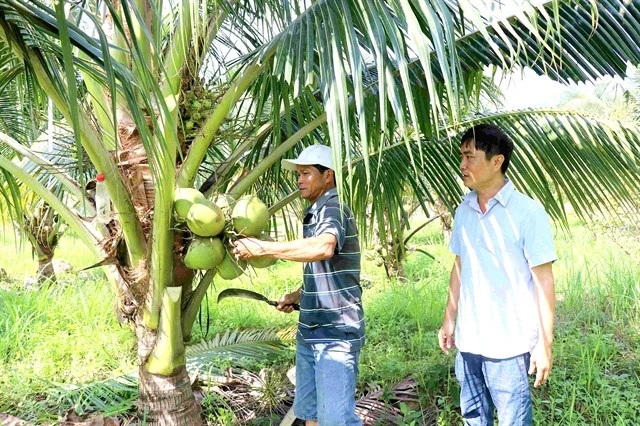
See more
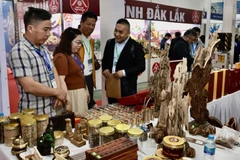
Vietnam Expo 2025 opens, spotlighting digital transformation, innovation
This year’s edition, themed “Step together in a digitised world,” has attracted around 400 businesses from 18 countries and territories, with over 500 booths. Alongside traditional networking, it introduces online business-to-business (B2B) matching, enabling year-round connections.

Private sector encouraged to join major national programmes, projects
It must fully unleash the productive capacity and resources of the country through the private sector; mobilise all private resources for national development; harness the effectiveness of internal forces, including human, natural resources, history, and culture, while effectively combining them with external resources such as capital, technology, human resources, and management experience, he said.

Annual Vietnam-Cambodia business dialogue held in Cambodia
The annual business dialogue in Cambodia attracted around 150 delegates, including Vietnamese businesses and Vietnamese-origin companies operating in Cambodia across various sectors such as finance, banking, insurance, telecommunications, agriculture, construction, interior design, food services, transportation, logistics, trade, healthcare, and tourism.
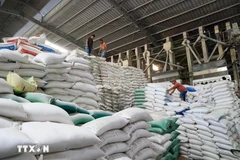
Vietnam-Cuba Business Forum held in Hanoi
Addressing the event, Cuban Ambassador Rogelio Polanco Fuentes affirmed that Cuba will always stand alongside the Vietnamese Government and business community in their efforts to achieve the challenging target socio-economic goals.
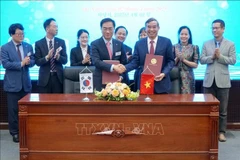
Da Nang, RoK's Pyeongtaek partner in semiconductors, high technology
By the end of 2024, the RoK had invested in 285 projects in Da Nang, with a total registered capital of 382 million USD, ranking among the top five foreign investors in the city.
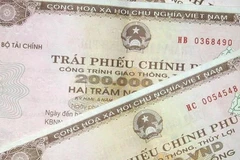
Over 2.54 bln USD raised through government bond auctions
These auctions raised an impressive 65.3 trillion VND (over 2.5 billion USD), an 124% increase compared to February, signaling strong investor confidence in the country's financial stability.
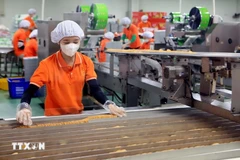
Party official anticipates breakthroughs in private economic sector
With the Politburo set to issue a dedicated resolution on the private economic sector, there should be a reformed approach to action plans, according to Secretary of the Party Central Committee and head of Head of its Commission for Policies and Strategies Tran Luu Quang.
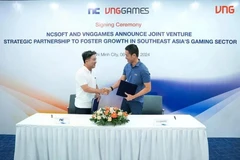
More RoK’s game developers target Vietnam
Over half of Vietnam's nearly 100 million population being gamers and the country's competitive labour costs are among reasons for Korean gaming firms' expanding presence in Vietnam.

Airfares surge ahead of April 30 - May 1 holidays
To regulate the market, the CAAV has taken measures to balance supply and demand on domestic routes and support airlines in enhancing their operational capacity.
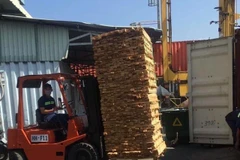
Vietnam cuts import taxes on key goods ahead of US tariff announcement
The quick response from Vietnam has won approval from industry leaders, with some considering the tax cuts as a "swift, positive, and timely" move that showcases Vietnam’s goodwill.

Vietnam Airlines marks 10 years of UK route operations
Vietnam Airlines launched its direct UK route in 2011, initially operating from London Gatwick Airport (LGW) before transitioning to Heathrow in 2015, improving connectivity to one of the UK’s major international hubs./.
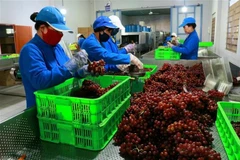
Vietnamese firms embrace green, digital export strategy to meet global standards
Nguyen Dinh Tung, CEO of Vina T&T Import Export Service Trading Co. Ltd., stressed that tougher technical barriers in global markets are creating a level playing field, compelling exporters to prioritise quality and compliance.
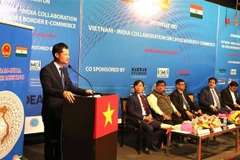
Seminar helps boost Vietnam - India e-commerce cooperation
The seminar, titled “Vietnam - India Collaboration in Cross-border E-commerce,” looked into both opportunities and challenges for Vietnam-India e-commerce cooperation.
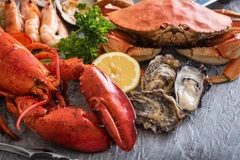
Vietnamese market opens to British live seafood products
The agreement is expected to generate over 20 million GBP (26 million USD) in revenue for the UK seafood sector over the next five years.

Cuban commerce official optimistic about bright future of Vietnam-Cuba cooperative ties
President of the Cuban Chamber of Commerce (CCC) Antonio Luis Carricarte Corona hailed Vietnam as Cuba’s second-largest trading partner in Asia and its top investor, spotlighting its foothold in the Mariel Special Development Zone via Viglacera. This zone, he noted, is set to become a pivotal hub for Vietnamese investment in the years ahead.
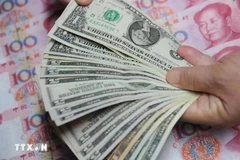
Reference exchange rate up 16 VND on April 2
The State Bank of Vietnam set the daily reference exchange rate for the US dollar at 24,851 VND/USD on April 2, up 16 VND from the previous day.
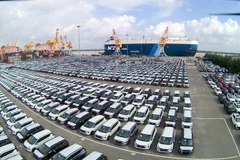
Ministry proposes tax cuts for some imported cars
This initiative aims to diversify the supply of imported vehicles, foster competition in the domestic market, and align Vietnam’s tax policies with the evolving trends of the automotive industry.

Vietnamese firms and success stories in Belgium
Since EVFTA took effect in August 2020, Vietnam’s exports to the EU have surged, with bilateral trade reaching 68.4 billion USD in 2024, a 47.5% increase from 2020.
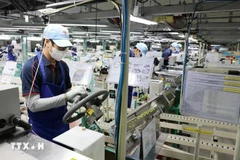
Vietnam – a destination for world leaders amid global trade tensions: Argentina newspaper
Argentina’s Infobae newspaper recently highlighted Vietnam’s growing appeal to world leaders amid escalating global trade tensions caused by new US tariff policies.
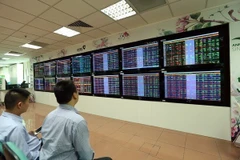
Five companies to auction shares in April at HNX
The first company participating in the auction is Transport Service No. 8, headquartered at 18 Ho Dak Di Street, Dong Da district, Hanoi.
